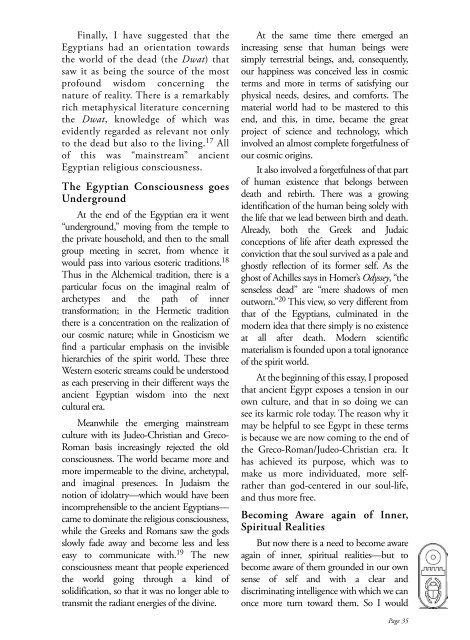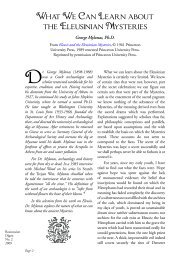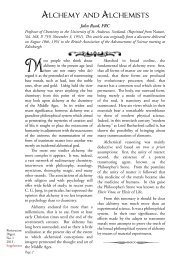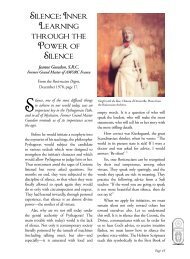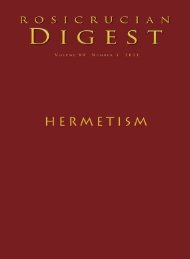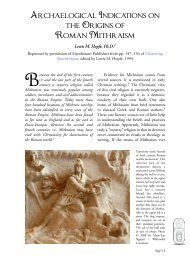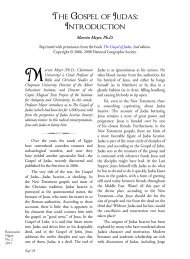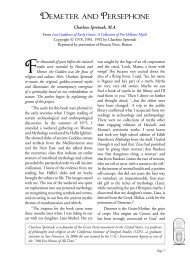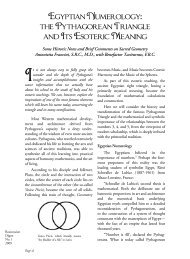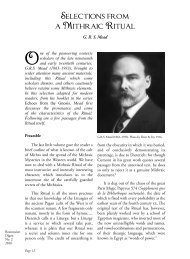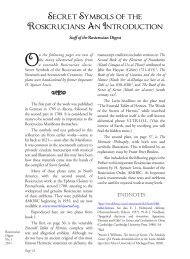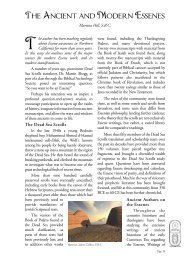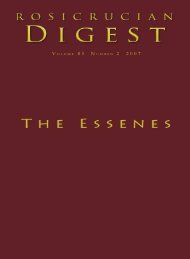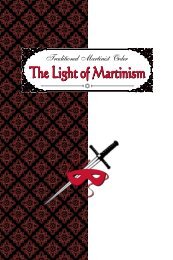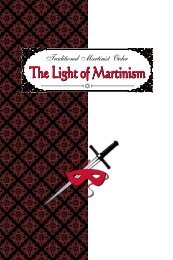Digest - Rosicrucian Order
Digest - Rosicrucian Order
Digest - Rosicrucian Order
Create successful ePaper yourself
Turn your PDF publications into a flip-book with our unique Google optimized e-Paper software.
Finally, I have suggested that the<br />
Egyptians had an orientation towards<br />
the world of the dead (the Dwat) that<br />
saw it as being the source of the most<br />
profound wisdom concerning the<br />
nature of reality. There is a remarkably<br />
rich metaphysical literature concerning<br />
the Dwat, knowledge of which was<br />
evidently regarded as relevant not only<br />
to the dead but also to the living. 17 All<br />
of this was “mainstream” ancient<br />
Egyptian religious consciousness.<br />
The Egyptian Consciousness goes<br />
Underground<br />
At the end of the Egyptian era it went<br />
“underground,” moving from the temple to<br />
the private household, and then to the small<br />
group meeting in secret, from whence it<br />
would pass into various esoteric traditions. 18<br />
Thus in the Alchemical tradition, there is a<br />
particular focus on the imaginal realm of<br />
archetypes and the path of inner<br />
transformation; in the Hermetic tradition<br />
there is a concentration on the realization of<br />
our cosmic nature; while in Gnosticism we<br />
find a particular emphasis on the invisible<br />
hierarchies of the spirit world. These three<br />
Western esoteric streams could be understood<br />
as each preserving in their different ways the<br />
ancient Egyptian wisdom into the next<br />
cultural era.<br />
Meanwhile the emerging mainstream<br />
culture with its Judeo-Christian and Greco-<br />
Roman basis increasingly rejected the old<br />
consciousness. The world became more and<br />
more impermeable to the divine, archetypal,<br />
and imaginal presences. In Judaism the<br />
notion of idolatry—which would have been<br />
incomprehensible to the ancient Egyptians—<br />
came to dominate the religious consciousness,<br />
while the Greeks and Romans saw the gods<br />
slowly fade away and become less and less<br />
easy to communicate with. 19 The new<br />
consciousness meant that people experienced<br />
the world going through a kind of<br />
solidification, so that it was no longer able to<br />
transmit the radiant energies of the divine.<br />
At the same time there emerged an<br />
increasing sense that human beings were<br />
simply terrestrial beings, and, consequently,<br />
our happiness was conceived less in cosmic<br />
terms and more in terms of satisfying our<br />
physical needs, desires, and comforts. The<br />
material world had to be mastered to this<br />
end, and this, in time, became the great<br />
project of science and technology, which<br />
involved an almost complete forgetfulness of<br />
our cosmic origins.<br />
It also involved a forgetfulness of that part<br />
of human existence that belongs between<br />
death and rebirth. There was a growing<br />
identification of the human being solely with<br />
the life that we lead between birth and death.<br />
Already, both the Greek and Judaic<br />
conceptions of life after death expressed the<br />
conviction that the soul survived as a pale and<br />
ghostly reflection of its former self. As the<br />
ghost of Achilles says in Homer’s Odyssey, “the<br />
senseless dead” are “mere shadows of men<br />
outworn.” 20 This view, so very different from<br />
that of the Egyptians, culminated in the<br />
modern idea that there simply is no existence<br />
at all after death. Modern scientific<br />
materialism is founded upon a total ignorance<br />
of the spirit world.<br />
At the beginning of this essay, I proposed<br />
that ancient Egypt exposes a tension in our<br />
own culture, and that in so doing we can<br />
see its karmic role today. The reason why it<br />
may be helpful to see Egypt in these terms<br />
is because we are now coming to the end of<br />
the Greco-Roman/Judeo-Christian era. It<br />
has achieved its purpose, which was to<br />
make us more individuated, more selfrather<br />
than god-centered in our soul-life,<br />
and thus more free.<br />
Becoming Aware again of Inner,<br />
Spiritual Realities<br />
But now there is a need to become aware<br />
again of inner, spiritual realities—but to<br />
become aware of them grounded in our own<br />
sense of self and with a clear and<br />
discriminating intelligence with which we can<br />
once more turn toward them. So I would<br />
Page 35


